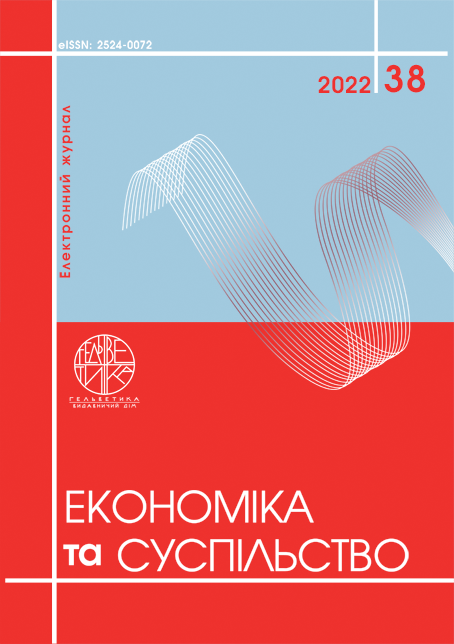INSTITUTIONAL, ORGANIZATIONAL AND LEGAL ASPECTS OF INTRODUCTION OF THE DUAL FORM OF EDUCATION IN HIGHER EDUCATION INSTITUTIONS
Abstract
Generalized experience has convincingly shown that reforms have only a chance to succeed if they are based on a solid institutional basis. This also applies to the modernization of higher education, which has been going on since the country gained independence. One eloquent example is the attempt to extend the conceptual principles of dual education to higher education institutions. It would seem that it has been studied the practice of its application in Germany, approved the order of the Cabinet of Ministers "Concept of training specialists for the dual form of education" and stopped, as if there were no positive intentions and optimistic expectations. Realizing that the problem needs to be solved as soon as possible, the author set the goal of initiating a discussion, which will result in a way out of the impasse in which domestic higher education institutions has been currently. Our reflections are based on the belief that the educational process is accompanied by the formation, maintenance and improvement of relations between its participants and between higher education institutions and external stakeholders. These relations develop in three-dimensional space with the following coordinate vectors: institutional, organizational, legal and economic. The range of subjects and the motives that stimulate them to get involved in dual higher education projects are outlined. Particular attention is paid to employers, as they are, firstly, interested in strengthening their intellectual potential, and secondly, able to play the role of donors for relevant educational and professional programs. It is proposed not to apply to them the requirement of licensing and accreditation of educational activities, as it is not the main type of their economic activity. In the light of the experience of European countries, it is proposed to strengthen the influence of chambers of commerce on resolving issues related to the introduction of forms of dual education. Among them is the assessment of the conditions created by enterprises for the admission of students and participation in the evaluation of the implementation of dual educational programs results. Industrial clusters are important in this context, as they are concerned, in particular, with staff recruitment for participating companies.
References
Марценюк Л.В., Груздєва О.В. Дуальна освіта як засіб ефективного поєднання теорії та практики. Економіка та держава. 2021. № 3. С. 58–65.
Шебанін В.С. Дуальна форма освітньої підготовки висококваліфікованих фахівців для аграрної сфери України. Економіка АПК. 2018. № 7. С. 5–15.
Кравчнко О. Дуальна освіта в Україні: від концепції до практики. Молодий вчений. 2021. № 2. С. 64–69.
Зінченко С.М., Зінченко А.Л. Дуальна освіта як запорука соціального партнерства у професійній підготовці випускників вишів: зарубіжний досвід. Наукові записки, серія: «Педагогічні науки». 2021. № 192. URL: https://pednauk.cuspu.edu.ua/index.php/pednauk/article/view/760
Закон України «Про вищу освіту». Верховна Рада України, 2022. URL: https://zakon.rada.gov.ua/laws/show/1556-18#Text.
Про схвалення Концепції підготовки фахівців за дуальною формою здобуття освіти: розпорядження Кабінету Міністрів України від 19.09.2018 р. № 660-р. URL: https://zakon.rada.gov.ua/laws/show/660-2018-%D1%80#Text.
Положення про дуальну форму здобуття вищої та фахової перед вищої освіти. Міністерство освіти і науки України. URL: https://mon.gov.ua/storage/app/media/gromadske-obgovorennya/2019/06/25/1 polozhennya-pro-dualnu-formu.docx.
Про затвердження Положення про Державну службу зайнятості. Наказ № 2663 від 16.12.2020 р. Міністерство розвитку економіки, торгівлі та сільського господарства України. 2020. URL: https://zakon.rada.gov.ua/laws/show/z1305-20#Text.
Положення про порядок організації та проведення дуального навчання у Національному університеті кораблебудування імені адмірала Макарова. Миколаїв. 2019. URL: https://bit.ly/3HTAHdd.
Ausbildungsverbünde. Betriebear beiteninder Lehrling sausbildung zusammen. URL: https://www.wko.at/service/t/bildung-lehre/Ausbildungsverbuende.html.
Martseniuk L.V., Hruzdieva O.V. (2021) Dualna osvita yak zasib efektyvnoho poiednannia teorii ta praktyky. Ekonomika ta derzhava. № 3. Рр. 58–65.
Shebanin V.S. (2018) Dualna forma osvitnoi pidhotovky vysokokvalifikovanykh fakhivtsiv dlia ahrarnoi sfery Ukrainy. Ekonomika APK. № 7. Рр. 5–15.
Kravchnko O. (2021) Dualna osvita v Ukraini: vid kontseptsii do praktyky. Molodyi vchenyi. № 2. Рр. 64–69.
Zinchenko S.M., Zinchenko A.L. (2021) Dualna osvita yak zaporuka sotsialnoho partnerstva u profesiinii pidhotovtsi vypusknykiv vyshiv: zarubizhnyi dosvid. Naukovi zapysky, seriia: «Pedahohichni nauky». № 192. URL: https://pednauk.cuspu.edu.ua/index.php/pednauk/article/view/760
Zakon Ukrainy «Pro vyshchu osvitu». Verkhovna Rada Ukrainy, 2022. URL: https://zakon.rada.gov.ua/laws/show/1556-18#Text.
Pro skhvalennia Kontseptsii pidhotovky fakhivtsiv za dualnoiu formoiu zdobuttia osvity: rozporiadzhennia Kabinetu Ministriv Ukrainy vid 19.09.2018, № 660-r. URL: https://zakon.rada.gov.ua/laws/show/660-2018-%D1%80#Text.
Polozhennia pro dualnu formu zdobuttia vyshchoi ta fakhovoi pered vyshchoi osvity. Ministerstvo osvity i nauky Ukrainy. URL: https://mon.gov.ua/storage/app/media/gromadske-obgovorennya/2019/06/25/1 polozhennya-pro-dualnu-formu.docx.
Pro zatverdzhennia Polozhennia pro Derzhavnu sluzhbu zainiatosti. Nakaz № 2663 vid 16.12.2020. Ministerstvo rozvytku ekonomiky, torhivli ta silskoho hospodarstva Ukrainy. 2020. URL: https://zakon.rada.gov.ua/laws/show/z1305-20#Text.
Polozhennia pro poriadok orhanizatsii ta provedennia dualnoho navchannia u Natsionalnomu universyteti korablebuduvannia imeni admirala Makarova. Mykolaiv. 2019. URL: https://bit.ly/3HTAHdd.
Ausbildungsverbünde. Betriebear beiteninder Lehrling sausbildung zusammen. URL: https://www.wko.at/service/t/bildung-lehre/Ausbildungsverbuende.html


